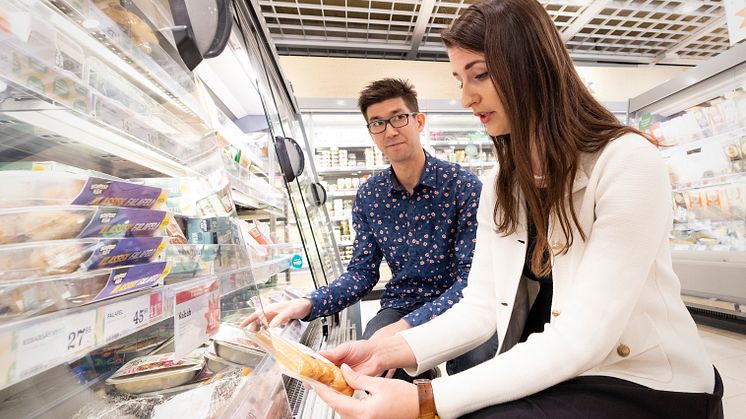
Press release -
How meat alternatives ended up on Sweden’s supermarket shelves
Twenty years ago, vegetarian options in Swedish supermarkets were few and far between. Today there is a broad selection of products available including vegetarian sausages and fillets, and veggie balls, the vegetarian version of meatballs. New research from Uppsala University shows how a range of actors have managed to drive this change, despite the fact that interest from politicians has been lukewarm at best.
A Swedish meat producer launches veggie balls – how did that come about? In a new study published in Technological Forecasting and Social Change, researchers describe how plant-based meat alternatives were able to gain ground in supermarkets.
“In the study, we show that a transition to more sustainable foods can be driven by businesses, consumers and civil society, even where there is little policy support – but that the focus then ends up on certain types of food products and not on others. More active policy is needed to steer this development, for example through dietary guidelines, research funding, taxation or subsidies,” says Thomas Lennerfors, one of the authors of the study.
Meat alternative rather than lentil soup
This development might not have happened without certain advantages that meat alternatives have, which the researchers call pragmatic legitimacy. They have been accepted because they are easy to prepare, available at a reasonable price to consumers, and are profitable for producers.
Since this development has mainly entailed creating new, easy-to-prepare products that companies can sell, the focus has been on alternatives that mimic meat.
“Some of these products have some problems with their nutritional content. For the ordinary consumer, it might be cheaper and healthier to learn how to prepare tasty vegetarian food, such as a lentil casserole, instead of choosing a veggie burger with a lot of salad dressing. But there is no particular focus on changing food habits in that direction. Instead, the emphasis has been on introducing new vegetarian products that mimic meat, targeting people who otherwise eat a lot of meat,” says Helena Fornstedt, the study’s lead author.
Based on interviews, newspaper articles, and reports
The study is based on interviews with 41 people who have worked with plant-based food in Sweden in various capacities. The researchers talked to entrepreneurs, product developers, chefs, farmers, researchers, buyers, journalists, and people in the public sector. In addition, they reviewed newspaper articles, reports, and scientific studies.
In the study, the researchers identify four events that were particularly important for this change:
In 2006, the UN released the report Livestock’s Long Shadow, which highlights the environmental impact of meat production. That same year, the issue of climate change gained widespread attention through American Democrat Al Gore’s documentary An Inconvenient Truth, and the Stern report from the UK, which showed that ignoring global warming is far more expensive than taking steps to curb it. This mobilised many people in Sweden to begin working to reduce meat consumption.
In 2012, the Swedish National Food Agency began including sustainability aspects in its evidence-based nutrition recommendations. This included recommending consuming no more than 500 grams of red meat per week.
In 2015, Oumph! – the first plant-based product with a texture reminiscent of meat – was launched in Sweden. The launch increases interest in meat alternatives and attracts private investors. In the same year, food industry management consultants Macklean published their protein shift report. The report stimulated a series of articles in national daily newspaper Svenska Dagbladet, which in turn led to the word proteinskifte (Swedish for protein shift) entering the Swedish vocabulary in 2016.
In 2016, a Swedish Food Strategy was adopted. For the first time since Sweden’s accession to the EU, the spotlight turned once again onto Swedish food production. The Strategy also meant that public funding for research and innovation in the area of plant-based foods became more readily available.
How various companies were inspired to change becomes clear in the researchers’ interviews. According to a representative of a hamburger chain, the documentary An Inconvenient Truth was the catalyst for them to become more dedicated to their work for sustainability. A meat company began to take an interest in vegetarian food after the Macklean consultancy firm released their report on the protein shift.
This development could have happened faster
The study shows that many small acts can together change an entire system. It also points out that it is possible to build different forms of legitimation for more sustainable food. The researchers also argue that the development of sustainable vegetarian alternatives could be significantly faster if policy took a more active role.
“More supportive policy that aims to drive change along with clearer initiatives from government agencies could accelerate and steer this development in multiple ways. These efforts could include recommendations from government agencies, similar to the National Food Agency’s dietary guidelines, or research funding that creates better opportunities for the development of delicious and nutritious products. Development can also be promoted through legislation, taxation and subsidies – for example a tax on meat or support for plant-based alternatives,” says Helena Fornstedt.
Contact person
Helena Fornstedt, postdoc at the Department of Civil and Industrial Engineering at Uppsala University.
Mobile phone number: +46 73-662 09 21
E-mail: helena.fornstedt@angstrom.uu.se
Thomas Lennerfors, Professor of Industrial Engineering at the Department of Civil and Industrial Engineering at Uppsala University
Mobile phone number: +46 70 167 95 53
E-mail: thomas.lennerfors@angstrom.uu.se
Article
Helena Fornstedt, Thomas Taro Lennerfors, Johnn Andersson, Paul Plummer, How configurations of legitimacy shape directionality in technological innovation systems: The case of plant-based meat alternatives in Sweden, Technological Forecasting and Social Change, Volume 220, 2025, DOI: 10.1016/j.techfore.2025.124283
Topics
Categories
Founded in 1477, Uppsala University is the oldest university in Sweden. With more than 50,000 students and 7,500 employees in Uppsala and Visby, we are a broad university with research in social sciences, humanities, technology, natural sciences, medicine and pharmacology. Our mission is to conduct education and research of the highest quality and relevance to society on a long-term basis. Uppsala University is regularly ranked among the world’s top universities. www.uu.se



